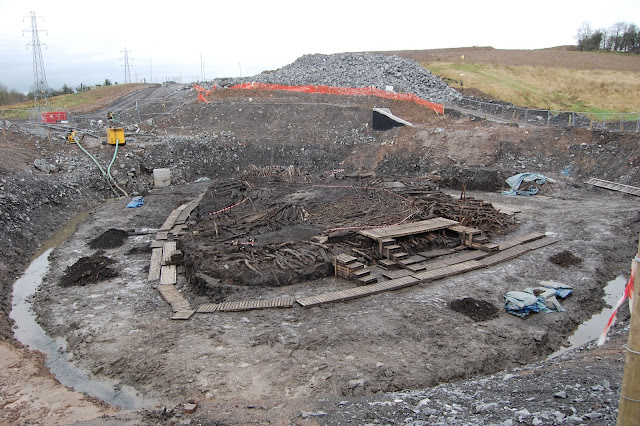[** If you like this post, please make a donation to the IR&DD project using the button at the end. If you think it is interesting or useful, please re-share via Facebook, Google+, Twitter etc. **]
My family and I are just back in from the Drumclay Crannog open day in Fermanagh, and I wanted to share some of my photos of the site. The first portion of the day consisted of a presentation on the background of crannogs generally and the current state of knowledge of the site type in Fermanagh, in particular. Other sections of the presentation concentrated on the finds and structures from the site. Overall, the crannog was described in terms of not just regional or national importance, but as an internationally significant site. I must admit that it was more than a little galling to hear the planning history of the site presented in such an ‘opaque’ manner with no mention of the fact that it required vast personal courage on behalf of a number of the original site crew to ensure that this site was properly excavated, along with the bravery and determination of so many professional archaeologists and interested parties to get us to the positive outcome we have now achieved. This is my only criticism of the day. Once this self-serving presentation was over we were bussed to the site itself. First we got to see some of the finds and then had a verbal tour of the site. From here on, I will largely let the photographs do the talking, but to mention that the currently exposed level is thought to date to the 7th century – apparently making it an unbroken sequence of settlement into the 17th century.

I have only one other comment on the day. That is to pay tribute to the extraordinarily skilled and dedicated archaeologists currently on site. They are carrying out a world-class excavation on an amazingly well-preserved site in terribly challenging physical conditions. They have my support and my utmost respect. They’ve done an amazing job in presenting this site to the public today (750 people booked the tour), and I look forward to seeing the publications on the site.
[** If you like this post, please consider making a small donation. Each donation helps keep the Irish Radiocarbon & Dendrochronological Dates project going! **]

















Still looks like they have a long way to go... but what a site. That wide shot you have... well frankly... it gives me the archaeological equivalent of the horn ;)
ReplyDeleteGlad you liked ... I think! ;)
DeleteRobert I agree with every word of that, the presentation at the start that glossed over the initial fiasco was, as you say, very self-serving indeed. But after that, what a site! Blown away by the archaeology.
ReplyDeleteI was thrilled to see so many families with young kids too, really heartening to see such interest. Must have been hard-going for Cathy and the crew but they handled themselves brilliantly and did a great job in highlighting just why this site is so important.
Again I say without reservations that the site crew that first highlighted what was happening, you, Jean, Matt and everyone else who made sure that this site got the time and attention it needs, deserve the respect and gratitude of all interested in the story of our past.
i live here in America and it just makes my heart ACHE that the road can't be moved a bit so that this site can be studied properly. Politicians make me crazy in the insane and unbelievable things they do. I have read that they have spent so much time measuring and planning where to put the road, well, it hasn't been anywhere near the thousands of years this crannog has been there. I understand this road is being rushed for a meeting? I am sure there must be an airport nearby that they could fly into and if they knew about this find I am sure they wouldn't mind. To me it's a no-brainer. Good luck in your fight over there. I am sure it might seem hopeless. I hope another solution can be found.
ReplyDelete